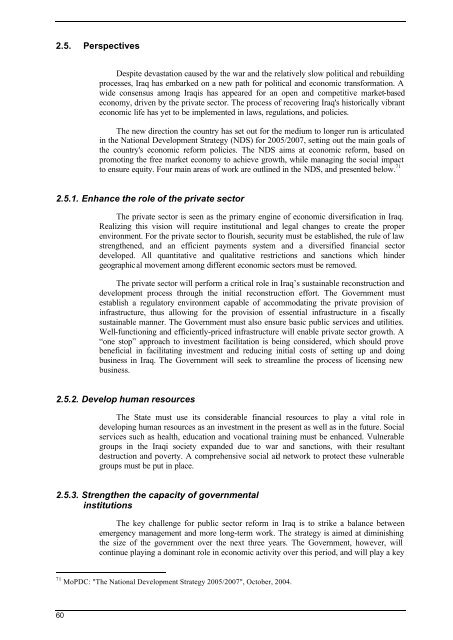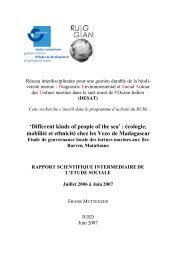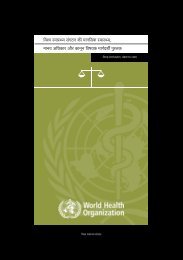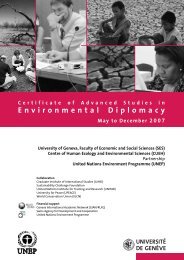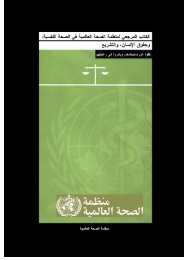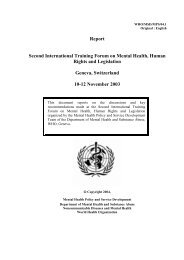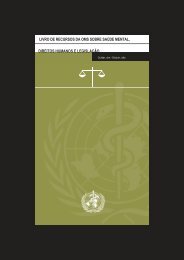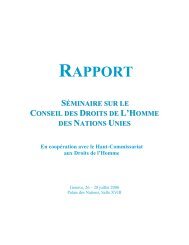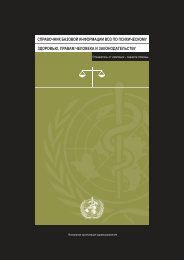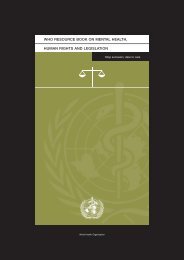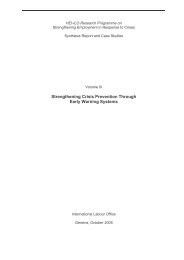2.5. PerspectivesDespite devastation caused by the war and the relatively slow political and rebuildingprocesses, Iraq has embarked on a new path for political and economic transformation. Awide consensus among Iraqis has appeared for an open and competitive market-basedeconomy, driven by the private sector. The process of recovering Iraq's historically vibranteconomic life has yet to be implemented in laws, regulations, and policies.The new direction the country has set out for the medium to longer run is articulatedin the National Development Strategy (NDS) for 2005/2007, setting out the main goals ofthe country's economic reform policies. The NDS aims at economic reform, based onpromoting the free market economy to achieve growth, while managing the social impactto ensure equity. Four main areas of work are outlined in the NDS, and presented below. 712.5.1. Enhance the role of the private sectorThe private sector is seen as the primary engine of economic diversification in Iraq.Realizing this vision will require institutional and legal changes to create the properenvironment. For the private sector to flourish, security must be established, the rule of lawstrengthened, and an efficient payments system and a diversified financial sectordeveloped. All quantitative and qualitative restrictions and sanctions which hindergeographical movement among different economic sectors must be removed.The private sector will perform a critical role in Iraq’s sustainable reconstruction anddevelopment process through the initial reconstruction effort. The Government mustestablish a regulatory environment capable of accommodating the private provision ofinfrastructure, thus allowing for the provision of essential infrastructure in a fiscallysustainable manner. The Government must also ensure basic public services and utilities.Well-functioning and efficiently-priced infrastructure will enable private sector growth. A“one stop” approach to investment facilitation is being considered, which should provebeneficial in facilitating investment and reducing initial costs of setting up and doingbusiness in Iraq. The Government will seek to streamline the process of licensing newbusiness.2.5.2. Develop human resourcesThe State must use its considerable financial resources to play a vital role indeveloping human resources as an investment in the present as well as in the future. Socialservices such as health, education and vocational training must be enhanced. Vulnerablegroups in the Iraqi society expanded due to war and sanctions, with their resultantdestruction and poverty. A comprehensive social aid network to protect these vulnerablegroups must be put in place.2.5.3. Strengthen the capacity of governmentalinstitutionsThe key challenge for public sector reform in Iraq is to strike a balance betweenemergency management and more long-term work. The strategy is aimed at diminishingthe size of the government over the next three years. The Government, however, willcontinue playing a dominant role in economic activity over this period, and will play a key71 MoPDC: "The National Development Strategy 2005/2007", October, 2004.60
ole as provider of public goods thereafter. Great attention must be given to promotingadministrative capacity. Governmental structure will be reconsidered, with the intent toeliminate governmental departments that compete with the private sector in economic andservice activities. The State will come to rely on the private sector for some purposes,rather than attempting to internalize these functions by enlarging its departments.An immediate need is for Iraqi institutions to strengthen systems of accountability.This will both improve the efficient use of Iraqi resources and facilitate the flow of donorfunds; this is particularly important to allow Iraq to absorb a large degree of donorassistance using its own existing administrative and implementation structures and withoutcreating parallel systems. The Government is also called upon to provide services to itscitizens in a transparent, respectful, efficient and dedicated manner, free of corruption. Thiswill require improved management to increase the efficiency of most governmentaldepartments, and attracting and training competent young people.A general civil service reform framework must be considered including all aspects ofhuman resource management, but focused on fiscal sustainability and ensuring atransitional process without creating socia l unrest. Additional accountability institutionsand anti-corruption initiatives are required, as is a system for setting priorities in publicspending, a degree of fiscal decentralization, improved public procurement and strongerfinancial management.Recent indications point to substantial progress in removing some of the obstacles toan open market. This progress, modest but positive, has been reflected in thestandardization of currency value, checking of the inflation rate, the institutionalization ofan open trade and investment regime with an emphasis on strengthening the private sector.Increase in external reserves and currency stabilization as a result of improvedmanagement of the money supply have helped in reducing inflation to 20 - 25 per centcompared to 40 - 50 per cent in 2004. 72 Some of these achievements have been reflected inrecent estimates of GDP per capita rising to about 1,200 US$ in 2004. 73 While theexchange rate has remained largely unchanged, the CBI aims to build up its netinternational reserves to at least 6.0 billion US$ by end of 2005. 74 Further, by the end of2004, oil production, which constitutes about three quarters of the economy, hadrecovered. Non-oil economic activity has also been recovering, driven by reconstructionand a partial revival in the agricultural sector, although many enterprises are not yet fullyoperational. Commercial activity at the retail level is brisk.However, two perilous areas, namely unemployment and security, continue to be themost challenging issues that could seriously undermine the whole economic, social andpolitical transformation the country is undergoing. The over two million unemployed areconsidered as one of the major sources of instability; job creation is therefore vital tobuilding peace and stability in Iraq. Reducing unemployment rates could make a majorcontribution in this regard, which could in turn help generate a recovery in investment andgrowth, or "at least reduce its detrimental effect on the livelihood, security and progress ofIraq.” 75 A “plan of action”, which was adopted by the International EmploymentConference on Jobs for the Future of Iraq, organised by the ILO in December 2004 inAmman, focused on the optimal means to capitalize on the reconstruction drive in Iraq andhow it can create jobs. 7672 Mr. Senan Al Shabibi Governor of the CBI)73 Dr Mehdi AlHafidh, former Minister of Planning and Development Cooperation, Speaking at a Conference onRebuilding Iraq, Amman, 200574 IMF Country Report no..o4/325, September, 200475 Former Iraqi Labour and Social Affairs Minister Leila Abdul Latif statement to the ILO Amman Conference,December, 200476International Employment Conference Jobs for the Future of Iraq, Amman, 12 to 13 December, 200461
- Page 1 and 2:
HEI-ILO Research Programme onStreng
- Page 3:
PrefaceThis three-volume series res
- Page 7 and 8:
Table of contentsPreface...........
- Page 9:
The Private Sector and Social Partn
- Page 13:
Executive summaryPrivate enterprise
- Page 16 and 17:
IGOs, NGOs—tend to exclude, or at
- Page 18 and 19: • The World Bank has created a kn
- Page 20 and 21: 2. Private enterprises in conflict-
- Page 22 and 23: Figure 1: The Private Sector Employ
- Page 24 and 25: 2.3. Case study: Promoting multi-et
- Page 26 and 27: downstream, i.e. refining and distr
- Page 28 and 29: Box 1: How does Somalia’s private
- Page 30 and 31: Sectoral aspectsthere will be added
- Page 32 and 33: inequities in pricing. “Of the 16
- Page 34 and 35: into the armies are thereby also at
- Page 36 and 37: 3. Private enterprises and social p
- Page 38 and 39: Two natural disasters which have be
- Page 40 and 41: Box 4: Cooperatives in crisis respo
- Page 42 and 43: partners, the tripartite cooperatio
- Page 44: 36forces and that are able to perfo
- Page 48: AcknowledgmentsThe authors of this
- Page 51 and 52: 6.2. Delimiters of women’s econom
- Page 54 and 55: Executive summaryDespite the rich n
- Page 56 and 57: 1. IntroductionSince 1979, under th
- Page 58 and 59: 2. Country profileThe Republic of I
- Page 60 and 61: • activities related to reconstru
- Page 62 and 63: for university education concerning
- Page 64 and 65: 2.4. Economic environment assessmen
- Page 66 and 67: Unemployment (15 years of age and a
- Page 70 and 71: 3. The rationale of SME sector deve
- Page 72 and 73: 4. Iraq's SME sector: A profile4.1.
- Page 74 and 75: The Private sector employment pyram
- Page 76 and 77: Table 8: Estimates of total formal
- Page 78 and 79: Feasibility study: almost all respo
- Page 80 and 81: Table 9: Percentage of female entre
- Page 82 and 83: Factors for public sector preferenc
- Page 84 and 85: The recessionary indication of busi
- Page 86 and 87: Special investment legislation and
- Page 88 and 89: 8. Small entrepreneurs in Iraq: Sto
- Page 90 and 91: a reasonable income and independenc
- Page 92 and 93: 9. RecommendationsSME-development s
- Page 94 and 95: Longer-term SME developmentBesides
- Page 96 and 97: • literature and artistic service
- Page 98 and 99: 2. List of interviews with governme
- Page 100 and 101: 11. Why did you decide establishing
- Page 102 and 103: 33. What are the cost components of
- Page 104 and 105: 59. Are you working on a project, o
- Page 106: Promoting multi-ethnic stakeholder
- Page 109 and 110: 101
- Page 111 and 112: 103
- Page 113 and 114: 105
- Page 115 and 116: 107
- Page 117 and 118: 109
- Page 119 and 120:
Research methodologyThe research te
- Page 121 and 122:
possibility of conflict. In 1992, a
- Page 123 and 124:
2.2.2. PovertyAfter the break-up of
- Page 125 and 126:
of almost 10 per cent of GDP, yet i
- Page 127 and 128:
Source of initial financing: privat
- Page 129 and 130:
‘It is important to point out tha
- Page 131 and 132:
4.2. The economic resilience of int
- Page 133 and 134:
medium-sized companies employing 24
- Page 135 and 136:
5.2. Addressing constraints for SME
- Page 137 and 138:
5.4. Support to local initiativesSM
- Page 139 and 140:
ConclusionConsidering the actual an
- Page 141 and 142:
Scott, Norman: Macedonia: A Brief E
- Page 143 and 144:
Official gross reserves 4 290 450 7
- Page 145 and 146:
4. Survey questionnaire1. Name of t
- Page 147 and 148:
139
- Page 149 and 150:
141
- Page 151 and 152:
143
- Page 153 and 154:
2. Le contexte2.1. Le paradoxe ango
- Page 155 and 156:
Composition et description des Futu
- Page 157 and 158:
Les généraux angolais sont prése
- Page 159 and 160:
Les syndicats officielsL’Union na
- Page 161 and 162:
Une étude réalisée en 2003 pour
- Page 163 and 164:
3.3. Sortir du cercle vicieux : vie
- Page 165 and 166:
Annexes1. Morceaux choisis : le «
- Page 167 and 168:
159
- Page 169 and 170:
L’implication des partenaires soc
- Page 171 and 172:
Table des matièresTable des matiè
- Page 173 and 174:
RemerciementsQu’il me soit permis
- Page 175 and 176:
Liste des acronymesAFASPAALEANEAANS
- Page 177 and 178:
GlossaireAide d’urgence :Aléa :A
- Page 179 and 180:
Résumé exécutifAu cours des dix
- Page 181 and 182:
1. IntroductionLe département de R
- Page 183 and 184:
Limites de l’étudeAvant de proc
- Page 185 and 186:
évalué à plus de deux milliards
- Page 187 and 188:
2.2.2. Aspects démographiquesLes p
- Page 189 and 190:
2.3.3. EducationDès l’indépenda
- Page 191 and 192:
création de fonds de stabilisation
- Page 193 and 194:
3. Analyse des formes de réponse :
- Page 195 and 196:
• le secteur de l’Eau sera dest
- Page 197 and 198:
• la révision de la législation
- Page 199 and 200:
de main-d’œuvre, encourageant la
- Page 201 and 202:
leur fournissait les équipements e
- Page 203 and 204:
matérielle sous des formes diverse
- Page 205 and 206:
centre de l’attention des partena
- Page 207 and 208:
• le rôle dévolu à la commissi
- Page 209 and 210:
Renforcer le rôle de solidarité d
- Page 211 and 212:
ConclusionLa dimension de la tache
- Page 213 and 214:
Equipe Multidisciplinaire pour l’
- Page 215 and 216:
2. Séries statistiquesTable 8 : Ev
- Page 217 and 218:
Table 11 : Répartition de la popul
- Page 219 and 220:
Table 2 : Liste détaillée des com
- Page 221 and 222:
Table 4 : Dispositif d’interventi
- Page 223 and 224:
Organisation de l’unité syndical
- Page 225 and 226:
- Centre technique de construction.
- Page 227:
219


